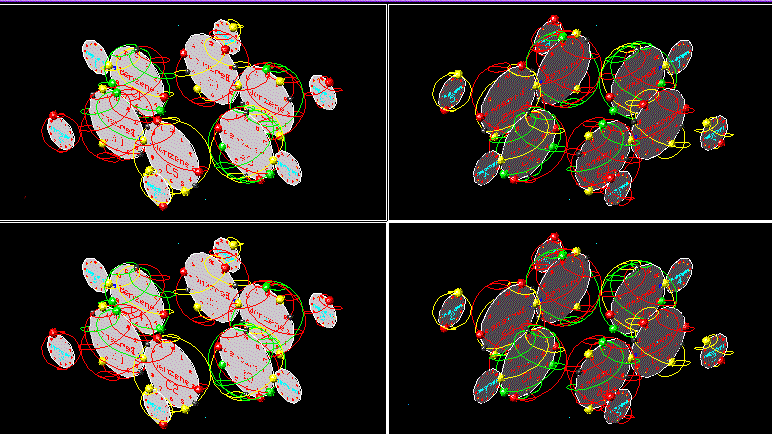The Galaxy Model for the Atom
The Universal Fractal
The Galaxy Model for the Atom describes matter as being made from
smaller versions of itself, like galaxies are made from atoms. Atoms
are, therefore, modelled as being, at any instant, spinning discs- like
galaxies, and galaxies are thus seen to be precessing in order to be
spherical over time- like atoms.
The Universe is thus proposed to be a huge fractal, based on an
atom/galaxy iteration. Galaxies are about 10^22m in size. Atoms are
about 10^-9m in diameter. This ratio of 10^31:1 is proposed to continue
down
as one goes to smaller and smaller versions of matter, so the matter
making up atoms
must be about 10^-40m in size. And so on.
This means that there has to be "fractal radiation", as well;
fractional emr that is 31 orders of magnitude smaller and higher in
frequency for each size smaller version of matter. Space must be
therefore be full of these smaller versions of
photons and neutrinos which must be produced by the mini-suns that make
up our
electrons. Electrons must be constantly fusing this mini-matter. and
each level of matter below them will thus also have smaller and faster
versions of electromagnetic radiation.
And finally, it means that none of us is alone. We must be completely
awash in intelligent life that inhabits every one of our 10^27
Carbon atoms. Life that is fractals of all the Life around us. Life
in our own Image, and in all of those people and animals and plants and
all
the other forms around us.
Space
As above, so below.
The Space of atoms takes the same form as the Space of galaxies. For
galaxies, which are made from atoms, Space is composed of all the
versions of matter that are smaller than atoms. Since the
Universe is Fractal in
Nature, Space is not empty- it is FULL of all these smaller iterations.
What is
then readily apparent is that it is full of energy and structure and
can
flow and spin like any fluid. Nothing is nothing. This is how our
photons travel- as a traveling wave
in this "super fluid'. This is what our atoms are made from- from
standing waves of
linked rotations- in this never-ending, smaller and
smaller-grained
ocean.
The Atom
When you take a turning disk and simultaneously make it precess at
twice the frequency that it is turning, ALL of its points will follow
the same type of pathway. Here are several looks at this pathway:
http://users.accesscomm.ca/sefton/2electronorbital.GIF
http://users.accesscomm.ca/sefton/1-2orbit.jpg
https://www.facebook.com/478430759170202/posts/823040878042520/
This is, I believe, what conventional Science terms the 'spinor'. As
the disk completes one full rotation, it is precessing through two full
revolutions. You can picture this as a point starting at the north pole
of a sphere and spiralling one full turn down to the south pole,
and then continuing to spiral the same direction for one full turn as
it returns up to the north pole.
Atoms are, at any instant, rotating discs that are precessing at twice
their rotation. Of course, this then means that galaxies are also
precessing to sweep out spheres. This would explain galaxies'
spherical, double-layered halos. It would explain their warped, twisted
discs. It would explain their bent jets. And, it would explain their
asymmetrical galactic rotation curves.
Here is the shape of the Milky Way that has just recently been
determined:
https://www.theguardian.com/science/2019/feb/04/milky-way-is-warped-and-twisted-not-flat
85% of spirals show evidence of warping. The warping is because they
are precessing. They are locked into a one rotation/two precessions
standing wave. This 1:2 standing wave can then be used to model
molecules, and I have used them to do the classical model for
Benzene, below, , where the green spheres represent the third electron
that Science says must be 'delocalized'.

Galaxy2